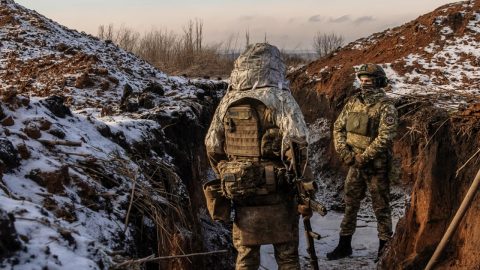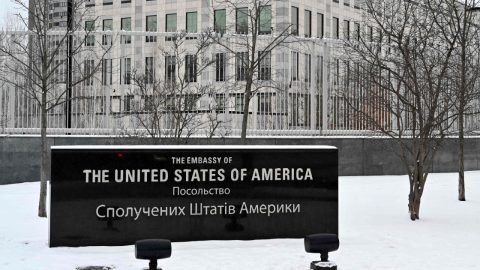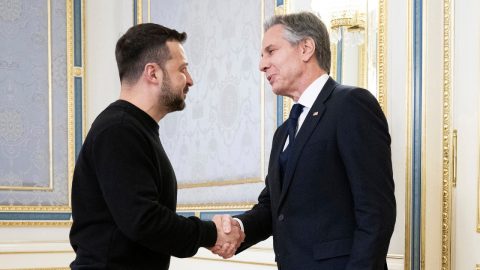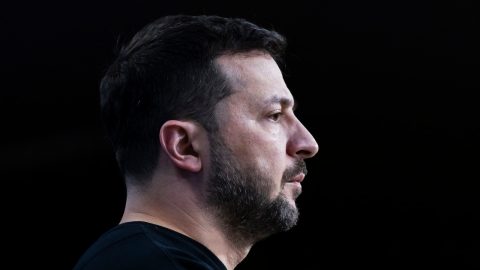Over a 26-year career with the CIA, Marc Polymeropoulos recruited spies in the back alleys of sketchy neighborhoods, chased terrorists across the Middle East and helped run operations against Russia.
But nothing in his tenure scared him as much as the symptoms that knocked him flat in a hotel room in Moscow in December 2017.
“I couldn’t stand up,” he said. “I was falling over. I had an incredible sense of nausea and ringing in my ears. I was, frankly, terrified.”
Polymeropoulos, who granted his first television interview to NBC’s Andrea Mitchell for the TODAY show Monday, never felt right again, and he came to believe he was among the American diplomats and spies who suffered from the so-called Havana Syndrome, the mysterious affliction that first cropped up among officers at the American embassy in Cuba in 2016.
He became so debilitated from fatigue and chronic headaches that he retired from the CIA last year, still unsure of what exactly had hit him.
Now, a study by some of the world’s most prominent brain experts — first reported Friday night by NBC News – has validated what some American intelligence officials have long believed, by concluding that the most plausible explanation for the symptoms suffered by at least some of the affected American officers is “directed, pulsed radiofrequency energy,” a type of energy that includes microwaves.
While not definitive, the report by the National Academies of Sciences, Engineering, and Medicine is the most authoritative examination of what may have caused the mysterious illnesses. It validates the belief by those affected that something significant happened to them, and repudiates skeptics who chalked “Havana Syndrome” up to psychosomatic illness or distorted the findings of a research paper to blame the symptoms on sounds made by crickets.
The study didn’t directly conclude that Americans were targeted in a Russian attack by a microwave device, as some American intelligence officials believe, but it raised the possibility, because Russians have done the most work on microwave energy.
“What we found was that there is a literature that describes health effects of a particular form of microwave energy, which is pulsed and directed,” Dr. David Relman, a professor of medicine at Stanford University who led the study, told Mitchell in an interview. “And that literature now goes back a number of decades, and was published largely by the former Soviet Union. That literature does mimic and is consistent with a number of the clinical findings that we noted.”
The study’s baseline conclusion, Relman said, was that “something very distinct and unusual happened to these individuals.”
And, he added, “the view of some of the world’s most-renowned neurologists” was that “among the various possible mechanisms that would explain these cases, there was one that stood out. And that was pulsed directed radio frequency energy, or microwave energy. In other words, it could be focused on one room and not another room in the same house. That’s the nature of how this kind of energy can be delivered.”
The study considered whether chemicals, viruses or psychological factors caused the symptoms, and it could not rule out that psychological factors have impacted some of the cases.
The Russian government has denied any involvement in what happened to the American diplomats and spies.
The U.S. has said that 26 government workers were injured in unexplained attacks at their homes and hotels in Havana starting in late 2016, causing brain injuries, hearing loss and problems with cognition, balance, vision and hearing problems. Strange sounds heard by the workers initially led investigators to suspect a sonic weapon, but the FBI later determined sound waves by themselves couldn’t have caused the injuries.
Since then, the toll of potential victims had grown to more than 40, and possible incidents have been reported in Europe, Asia and Australia.
A number of new incidents have been reported involving CIA officers in the last year or so, a source with direct knowledge told NBC News, including a CIA officer who experienced symptoms in Poland last spring, two CIA officers allegedly hit in East Asia last fall, and incidents in London in May and December 2019.
The source said the CIA, using mobile phone location data, had determined that some Russian intelligence agents who had worked on microwave weapons programs were present in the same cities at the same time that CIA officers suffered mysterious symptoms. CIA officials consider that a promising lead but not conclusive evidence. GQ magazine first reported on the geolocation.
Director Gina Haspel expressed skepticism when briefed on the geolocation intelligence, the source said.
The CIA declined to address that, saying in a statement to NBC News: “The Agency’s top priority is the health and well-being of our officers. If there were credible intelligence that showed an adversary purposefully harmed a CIA officer, you can bet Director Haspel would act swiftly and decisively.”
The agency did not comment on whether there was such intelligence, or what its Russia experts have concluded about possible Russian involvement.
The State Department, responding to the National Academies of Sciences report, said that “each possible cause remains speculative” and added that the investigation, now three years old, is still “ongoing.”
Although it praised the National Academies of Sciences for undertaking the effort, the State Department offered a long list of “challenges of their study” and limitations in the data the academies were given access to, suggesting that the report should not be viewed as conclusive.
“While the above limit the scope of the report, they do not lessen its value,” the State Department said in an emailed statement. “We are pleased this report is now out and can add to the data and analyses that may help us come to an eventual conclusion as to what transpired.”
Lawmakers from both parties over the weekend called on the government to step up its investigation of the matter and to make sure every possible victim receives treatment, something that Polymeropoulos and others said has not always happened.
“There has to be an institutional way in which we treat our people better,” he said. “I talked about the pact that you make when you join an organization like the CIA, or frankly, for the State Department as well, that you’re asked to do hard things, and your leadership has to return that with the idea of getting care if you’re injured.”
He added, “I’d like to see that our medical staffs across the civilian agencies treat this more seriously. That if someone gets (hit) they can get treatment. And then ultimately, we have to find out who did this.”
Polymeropoulos was the CIA’s deputy chief of operations for the Europe/Eurasia Mission Center when he went to Moscow, a job that includes overseeing operations against Russia.
If what happened to him was in fact a Russian attack, it did its job. He cut short his CIA career at 50, and not a day goes by when he doesn’t experience a headache, he says, though he remains so relentlessly upbeat that friends and colleagues would never know it. He has written a book about leadership and developed a robust public profile as a former CIA officer willing to speak publicly.
“It’s just kind of this headache that is just never-ending,” he said. “I have deteriorated. My kids, they’re both in college now. You know, they thought their dad was Superman. And I’m not so much anymore.
“My children who saw me as a superman also have seen me on the floor of our house, in some agony.”










Recent Comments